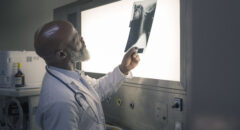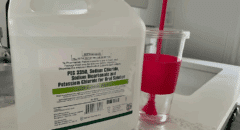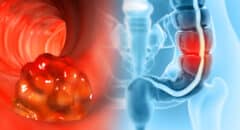
African Americans have the highest rates of colon cancer (also known as colorectal cancer). We face a 20 percent higher risk of developing colon cancer and a 45 percent higher mortality rate than any other race. Although this disease is the third cause of cancer-related deaths in the Black community, it’s highly preventable. BlackDoctor.org spoke with several medical professionals to see what can be done to lower the risk of colon cancer.
READ: A Spice That May Stop Colon Cancer
Dr. Strick Woods, gastroenterologist based in Bridgeport, CT, says that screening is the first step towards Black men lowering their risk. The American College of Gastroenterologists recommends Black men be screened starting at age 45 - five years earlier than whites. The reason? Colon cancer is often diagnosed in African Americans at a younger age. Dr. Woods says the current compliance rate for colonoscopies is at a mere 38 percent. African American have a notably low screening rate which puts us at adverse risk for developing colon cancer. Dr. Woods suggests a new way for Black men to get screened from the privacy of their home.
Cologuard is an at-home stool test that detects certain genetic markers associated with colon cancer. It’s recommended for anyone over the age of 50 that doesn't get the prescribed colonoscopy every five years. Users who test positive for these genetic markers are referred to get a colonoscopy at their doctor.
“Cologuard is poised to change that low compliance rate by screening more people. Unlike other screening options—patients take Cologuard in the comfort of their own home, with no prep (drinking of that solution), no invasive procedure, no sedation, no time off of work. Literally, all you have to do is provide a sample (poop in a cup that clips on to your toilet) and mail it to the lab for analysis (UPS will pick it up for you). Cologuard is a first of its kind test that looks for both blood and DNA in a person’s stool, flagging cancerous and pre-cancerous cells (if pre-cancerous cells are found and removed, cancer is prevented from ever forming). A New England Journal of Medicine study found that the test identified 92 percent of colon cancers with 87 percent specificity. “
Jessica Iannotta is a registered dietitian and certified specialist in oncology nutrition (CSO). The healthy lifestyle guru says that a lifestyle of dieting and exercise can also get Black men back on track for success.
Of course we know that things like candy and soda contain lots of sugar, but other foods like tomato sauce and yogurt contain secret sugars and salts that are detrimental to the increased risk of cancer. The dietitian urges the brothers to try out new vegetables, fruits, grains and legumes.
“Kale and quinoa get a lot of attention, but there are lots of healthy, delicious, and inexpensive foods to enjoy. There are so many types of food out there, even picky eaters will find a few things they like.”
I know we love a big juicy steak but too much is where the problem lies, according to Iannotta. Research suggests a link between red meat and processed meats, and increased risk of cancer. She says that, “by eating smaller portion sizes of red meat and not eating meat at every meal, you can cut your risk while still enjoying foods you love.”
It’s important to get a sweat in 30 minutes a day according to the American Institute of Cancer Research. So grab a couple of the guys in the neighborhood and toss around a football for an hour or so before settling in for the evening.
Jessica offers us two immediate things Black men can do lower their risk of cancer.
- Divide your plate into three sections and fill two of those sections with things like fruits, vegetables, beans, and whole grains. Lots of fruits, vegetables, legumes, and whole grains have been shown to have inherent cancer fighting properties and help maintain a healthy body weight. A healthy weight is a great factor protecting you against cancer, but you don't want to lose weight overnight.
- Make a doctors appointment and get your vitamin D levels checked. Getting enough vitamin D has been linked to cancer prevention and African Americans are more likely to have low levels of this important vitamin.









